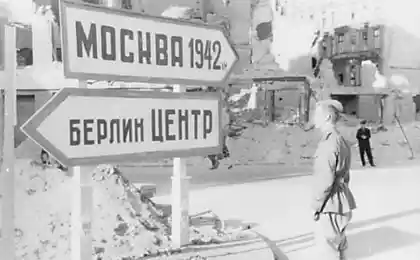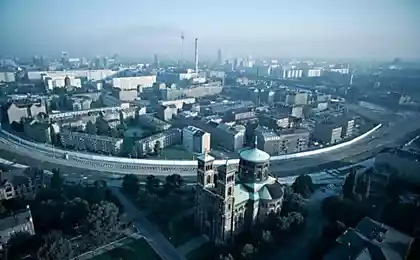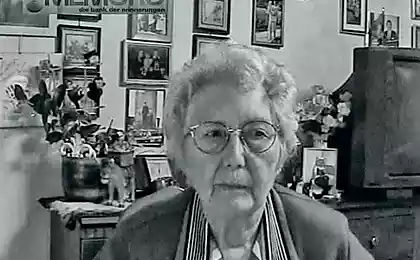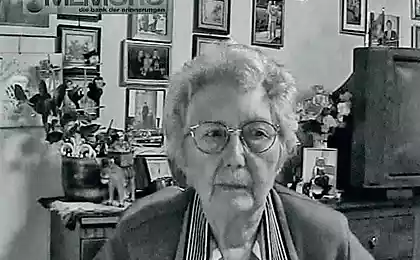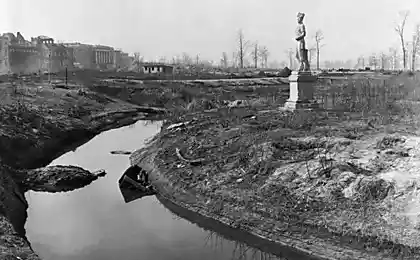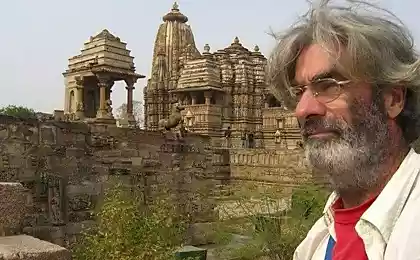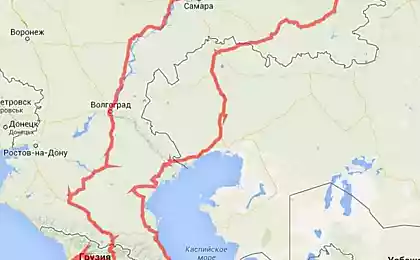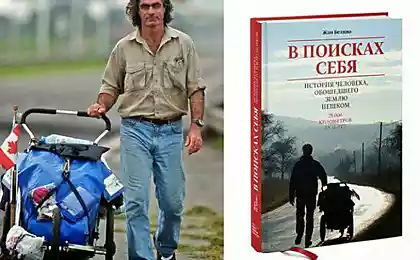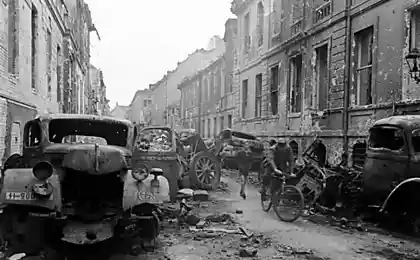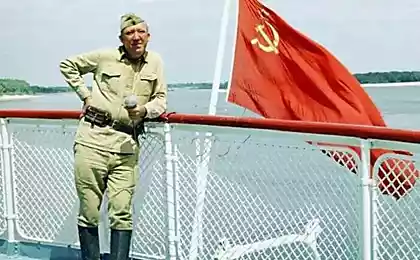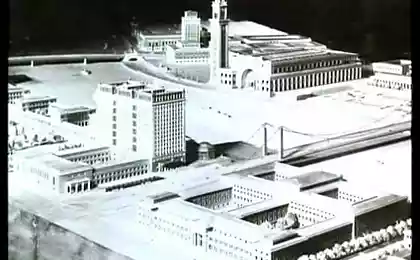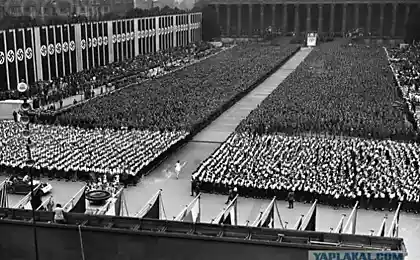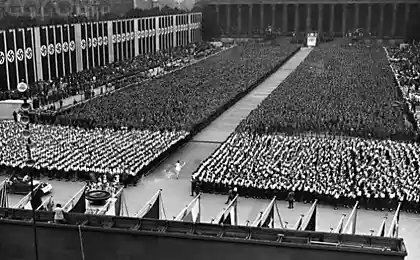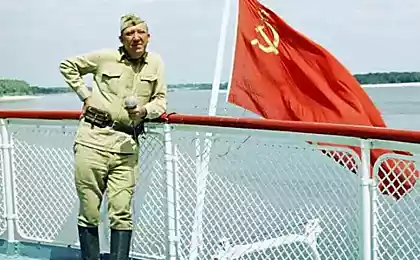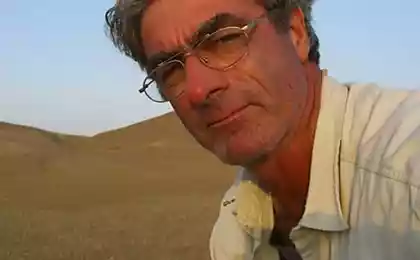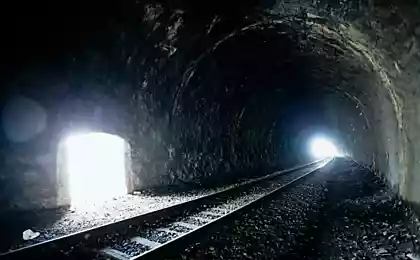1080
Walking distance to Berlin
Possible and accordion, but is willing to incur in this case deserved punishment ...
Gennady Kovalevsky,
World War II veteran.
Memories.
I was born on February 10, 1926 in the village of Zhuravlevka Tevrizsky Omsk region. My father, Ignatius Ivanovich, was born in Mogilev province in 1897. Mother, Alexandra Semyonovna Sobolev, was born in Ekaterinoslavl in 1903. In Siberia moved in 1907. The mother said she was married at age 17 "because of the wealth." Our family had many children: brothers and sisters, except for me, it was another ten souls. However, the older sister Sonia died in 1927, when she was three years old.
My mother had the title of "Mother Heroine" and receive benefits that have begun to pay off in 1938.
The village had 150 houses. According to his elders, before collectivization majority lived prosperously. The village had its own water mill on the river Imsysa, creamery and sherstobitnaya workshop. When organized farm, all Porush. And it was necessary to go to Tevriz - grinding flour and oil extraction. And there accumulate such a place that had to wait for 10-15 days. And another problem: according to eyewitnesses, socialized all the cattle, and he began to breathe. In 1931 famine. I'm not talking about the dispossession and expulsion of the wealthy for Vasyugan swamp.
But it's all I learned much later. And while I lived most of the boys - peers. Went barefoot in the village and not only small, but also old. Shoes only when going into the woods or on the hay. Footwear were sandals or teal, made of leather, which they themselves secretly started doing, because all skins need to take the state. Also dressed in all his own, homespun. Flax weaving canvas from it sewed clothes. Hemp rope Wiley and knitted chuviaki.
Zhuravlevka located in a picturesque location in the south of the Irtysh flows from the east - the river Imsysa, from the west, five hundred meters, there is a lake summer. In the lake a lot of fish: carp, tench, pike, perch. In winter, the fish gasping for breath, we made the hole and scooped it nets out of the water. Exported whole fish boxes. On the lake, I often went fishing rod. Arose when just beginning to dawn, took the bait, worms harvested and went to the lake. Always returned with a rich haul.
In our village every place had its own name. "The first gully" was from the village half a kilometer. There we went to collect blackberries and blueberries. "The second gully" was about a mile away. There we picked cranberries and mushrooms. Mushrooms, we took only white, aspen, boletus mushrooms and. A late autumn - mushrooms. There was an old mixed forest, trees - in girth adult hands.
To "Berendeev island" we went for pine cones. And we shishkovali two ways. We climb up the tree and collect cones in a bag that hangs on you, or thrown down. Or do kolot: cross nailed to a pole block, put the cedar and hit the trunk, ripe cones falling from a jar.
And once we have now gathered the boys go for an overnight Berendeev island, and he is 6 km from the village in a large swamp. It is very large, and we are many times it wandered. There grew a solid cedar, a lot of cranberry and cloudberry. And so, when we crossed the swamp, which is nearly three hundred meters wide, one of us saw a bear and shouted, "Bear!" - We looked around and froze: a hundred meters from us bear walking through the swamp, but in the opposite direction. Bear turned his head in our direction and went on his way, and we rushed back home. In our area are found two species of bears: black and brown. Black bypasses the human side, brown - more aggressive, may attack the person. We were lucky - he met a black bear.
We lived near the house hunter Pantelei. We told him about the meeting, and 3 days later he killed him, and treated us to bear meat. It was the only time I tried it. Her mother refused to eat, it was generally fastidious in food, never ate meat rabbits, horses and wild ducks. Yes, and I did not like the bear meat: it has an unpleasant smell, and it must be different seasoning spices to it to fight off.
On the banks of the Irtysh grew a lot of blackberries and drupes, but we did not take it. On the island, which is the Irtysh, we collected currants.
One mother said to me: "Come on over the winter associate dragnet. I'll spin hemp, and thou shalt bind. " My mother taught me to knit, and then we went. It was in 1940, when planted father gave one year because he took the horse without permission (even though he was the groom) to bring firewood. By spring I tied dragnet 6-8 meters long, and all the summer we caught them fish.
We lived in a small house of two rooms. The first was a large Russian stove, which slept so well, especially in winter. And so we slept in the front room on the floor, and his mother - on a wooden bed. Fuel is pine roots - "tar", which in the summer harvested and dried. In the winter we often organize gatherings: the women were going and doing needlework (who spun flax, who knit, who embroidered) and sang songs. My mother was a cheerleader and loved to sing. On the back is always working with the songs.
I am eight years he worked on the farm: drove manure on the field. Father harness horse Sadilov my cart, and I drove the horse. And as my father harvested wood sawed, chopped, put in the woodpile, winter drove home.
In May 1941, I graduated from the seven classes. And I am at least 15 years. And in the same May was a big water. In the evening when we went to bed, the water came up to the house of his grandfather Ivan, and we lived with him at the back, and in the morning the water was already in our fence. Was flooded the whole village, the fields and pastures.
And at the same time began dying horses (anthrax). Horses withdrawn at bestial cemetery, tied and they die there.
And here is one more trouble fell upon: Sunday village found out that we were attacked Hitler's Germany. The men gathered at the office and began: "Who is this Germany, but we have it cocked hat!". Immediately all drafted into the army, along with my older brother Anatoly (1922 born). And on the third day, and his father was summoned to the military commissariat, and two days later he was taken to the army, and we were alone again.
In the village we - teenagers have become the main force. We had to think, how to live. The fields are flooded, it is necessary to sow, you have to mow, but where? That brought us, old and young, and sent hay per 150 km, Bolsheukovsky District. And there we mowed, boating, mop, methane in the stack, and in the winter drove to the collective farm livestock. I had several times over the winter to go for hay. Load the cart, but in the meantime get there, half the cart horse feed. By the fall of water came down and began to grow grass, but did not have time to grow high. And mowed it in October and are frozen it in half with a heap of snow. In winter, it brought mixed with straw and fed cows.
That fall I was called to "postscript" to the draft board, and in winter for military training in the village Doronino. Here on Sunday engaged in military training, and the remaining six days in the forest to cut firewood. With us there was one Roma. He did not want to work and went to the mutilation: put his hand on a stump and hit her an ax. And then, when I came after the war in 1947 on vacation, he found me, though he lived in another village. And he showed me this hand: it is dry, there was a bone, covered with leather.
The winter of 1942 I was again called up for courses snipers. Trained in the village of Bely Yar studied device trehlineyki, sight and camouflage. Three times fired at targets at 300 and 500 m. He taught us lame lieutenant. He appointed me as his assistant. And now, I will cause division in the dining room and the command "right shoulder forward!", And it is necessary - left, but the guys without the commander knew where to go.
source senat.org
close if the accordion, while I continue PREPARATORY COURSES
November 2, 1943, when I was 17, I was drafted into the Red Army.
From our village called me and Golovneva Michael. In the evening, before leaving, the girls invited me to go and have been asking me to sing goodbye (I was singing at the time, in my opinion, not bad). So I sang it that night, "My father was a farmer natural ..." "There were days gay ...", "You do not Veit, brown curls ...", "Khasbulat Delete ..." and others.
From the collective farm I was given a peck of meal, the mother nastryapala muffins and pancakes. On seeing Uncle Nick came and uncle Agey. Mother got this bottle of vodka, and they drank. I had a single-barreled "perelomka" .32. And I salute goodbye from her, and Peter took us to Mihnevich Tevriz. In Tevriz we were joined by E. Sasha Moiseenko Gene, Miselev Sergei Fomin and Sasha. With them, I was trained and got one on the front of the battery. Then on horseback five days we get to Ishim. In Ishim we arrived already dark and we were placed in the hallway recruiting office. And in the morning passenger train was sent to Omsk.
In Omsk, we lived in a club named. Lobkova. He was at the train station and was fenced with a two-meter wooden fence. Here we spent 3 days sleeping on the scene. After that, we were loaded into wagons and taken to Kalanchinsk, school shooters. And since the school was fully staffed, we were sent to Kuibyshev Novosibirsk region. In Kuibyshev, we have identified in the Artillery School. We are located in a brick building on the banks of Omi. The first time when we ran thirty-degree frost in the morning to wash in the river. Before lifting the orderly came to clear snow from the hole. She was about five meters in length, a width of 20-30 centimeters. This went on for about a week until a wash basin in the room. The toilet was in the street, 150 meters from the barracks. In the barracks was a brick oven, drowned her firewood. The beds were made of metal, two tiers. Bed - mattress stuffed with straw, pillow, two sheets and a blanket.
Classes lasted 12 hours scheduled: rise at 6 am, an hour self-paced, half an hour - cleaning the horses every day, one hour ("dead time") rest and retreat at 23.00. The dining room is in the center of the city. And every day, three times we went there under the drill song.
Since we held classes drill, fire, tactical and physical training. Studied statutes. Teaches you how to ride a horse. Studied the material part of the 45-mm gun, MFR (antitank gun) and small arms.
The first lesson with us spent battery commander, Second Lieutenant Beklemeshev who explained to us what the artillery. He said that the artillery - the god of war, played a major role in the attack. Artillery clears the way for the infantry, artillery, and each higher on the head of an infantryman. Led a saying: "Fool goes to the cavalry and artillery in smart." He also cited the statement of the former Defense Commissar Voroshilov, "an artillery to be, especially artillery commander, it means to be fully educated man».
We are committed to taking care of horses. Went on duty at the stables, and went to the farm for hay. More we were taught how saddled his horse and ride horseback. When motion is commanded: "Allure!" - A step, "Allure two cross!" - Trot, "Allure three crosses!" - A gallop. To feed the horses were given cotton cake that crumbled, and fed the horses and ate themselves, or exchanged for a piece of bread for the Marines. Near us was the frozen storage of potatoes, which were taken to the dining room. We take these potatoes when went to landfill. There have been dug with the stove on it and we bake this potato. With wood it was worse, there was no place to take them. We ate at Cadet normal white bread - 200 g, black - 500 g butter - 30 g, which is said to have put in porridge - buckwheat or rice.
We were dressed in old (patching) outfit. Shoes on his feet with the windings, also worn. We were taught how to wind the coil and shoes, the length of which was about one and a half meters. And to four fingers below the knee.
At home, I was not spoiled, so quickly got used to the new conditions, did not go as some dumps and even some weight.
Sergei Melnikow we had a sergeant Quisqueya, he mocked us. All go to bed, and we will build it and starts talking in an hour on a teaspoon. Word say shut up, again a word and a long pause. Or sleep, and he commanded us: "End! The Climb. And so continuously for about 30 minutes so But we trained that in 45 seconds we had time to get dressed, wind puttees and stand in formation. And bring a weapon to "the fight" and "hang" for a minute. We have also worked out interchangeability rooms gun servants instead became a gunner battery instead of the commander - the gunner, and so on. D.
We fired live ammunition from the gun at targets, as well as anti-tank guns (MFR). PTR is equipped with a soft butt pad to cushion the impact, but if not prizhmesh tight butt, then swipes, what happened to me happened in pervosti. Then long shoulder ached.
Many others have had to learn the tricks. Everything and not tell. But, anyway, in March 1944, we took the oath. We were given new uniforms (shape, coat and boots instead of tarpaulin boots), awarded the title of "corporal" and sent to the front.
Chief echelon was appointed Beklemeshev, our platoon commander. The first stop was in Omsk, where we were fed a hot meal in the restaurant. Then we have three more times fed hot food, as well as all the way kept on dry rations to the last stop - Staraya Russa.
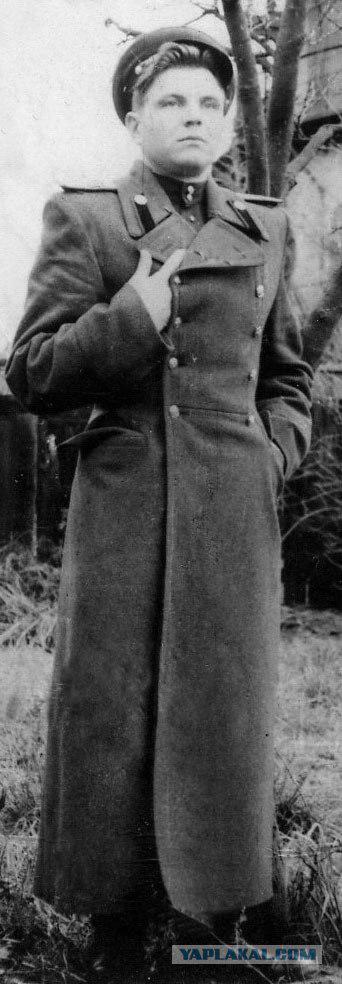
In defense
City is not, in ruins, just stick a pipe. We are told that recently there were heavy battles, and not all the dead still buried.
We moved the whole day and at night only came to firing positions antitank artillery. We Tevrizsky guys are in the same battery. Grandmother's commander walked with a crutch. The platoon commander first tested our knowledge and appointed me as the gunner.
At dawn, we started to look around. On our left was destroyed trees venison, front, in a hundred and fifty meters, the trench was our defense.
Our firing position (OP), as well as any consisted of in-depth site for guns, trench shelter for people to shelter trench ammunition caponier to hide guns and small dugout for the platoon to which you want to crawl on all fours. All this nestled under the camouflage net countryside views. Firing position is, as it were in a bag between the island city and Pskov depth of twelve kilometers and a width of three kilometers, so we fired from all sides, and access to our OP was only possible at night. Ahead, in kilometers per five to seven river was great. We often watched through our position flying our planes to bomb the crossing, as they knocked, and they are in flames, falling not far from us.
The first time I was interested in everything; in the air - fighting, shells exploding, but when he saw the broken body was not up to curiosity.
On the second day of the Gorky killed countryman area that went with us. Stripped it down to underwear and buried in a valley, close to the firing position. Killed were buried in underwear and without shoes.
They fed us when it gets dark, and in the morning before dawn. Village viewed from all sides. Morning and evening were given two crackers and half a pot of soup. Sometimes, bite off a piece of bread and a long suck, like candy, afraid to swallow. Not far from our position is a lake overgrown with reeds. That's where we crawled every day, tore reeds and white spruce it up a bit sweet root. With us from the same pot and ate a platoon commander. Although the officer he received extra rations (a little oil, biscuits and cigarettes), but he always shared with us.
One day they found in the village Olenino cellar with potatoes, and then we began to live. At night, cooked potatoes, and ate her all day. True, she was without salt, and the first time nauseated, but then the body was used.
The first time we were on the defensive, we took water from the funnel of pyatisotkilogrammovoy bomb. The water was taken at night. One afternoon was over water. Had to crawl to the funnel. And then we saw that there is floating dead soldiers. Reported to the commander. After that said do not take water from the lake, and we started to give disinfecting tablets.
During the defense once a month wash personnel and ironed all uniforms. Bath is located in a closed tent, where the hot water, and underfoot distribute branches. In the offensive bathing personnel conducted during the reorganization, when the remains of the little soldiers, and assign it to replenish. If the rearrangement is performed on site, then the soldiers left without a bath. Before the onset of the same issue rations (NC), which young soldiers immediately eat to kill if he was not in vain. Experienced soldiers, on the contrary, before the onset of not eating anything. And we were warned that if full stomach hurts, consider certain death.
We were in positions that were previously occupied by the Germans. In the Ravine was a large German dugout "seven layers of logs," and our infantry findings in the daytime with the front edge of the back to rest (sleep off), and at night took defense. And one day, when the infantry slept, and then placed at least 50 people in the dugout hit by a shell. The ceiling collapsed, and all the soldiers were buried there.
We, like all the artillery in the defense, a lot shoveled earth.
I'm worn out.
I agreed.
It was like this.
We packed up and drove off.
I agreed.
It was the best time of my life.
Source:
Gennady Kovalevsky,
World War II veteran.
Memories.
I was born on February 10, 1926 in the village of Zhuravlevka Tevrizsky Omsk region. My father, Ignatius Ivanovich, was born in Mogilev province in 1897. Mother, Alexandra Semyonovna Sobolev, was born in Ekaterinoslavl in 1903. In Siberia moved in 1907. The mother said she was married at age 17 "because of the wealth." Our family had many children: brothers and sisters, except for me, it was another ten souls. However, the older sister Sonia died in 1927, when she was three years old.
My mother had the title of "Mother Heroine" and receive benefits that have begun to pay off in 1938.
The village had 150 houses. According to his elders, before collectivization majority lived prosperously. The village had its own water mill on the river Imsysa, creamery and sherstobitnaya workshop. When organized farm, all Porush. And it was necessary to go to Tevriz - grinding flour and oil extraction. And there accumulate such a place that had to wait for 10-15 days. And another problem: according to eyewitnesses, socialized all the cattle, and he began to breathe. In 1931 famine. I'm not talking about the dispossession and expulsion of the wealthy for Vasyugan swamp.
But it's all I learned much later. And while I lived most of the boys - peers. Went barefoot in the village and not only small, but also old. Shoes only when going into the woods or on the hay. Footwear were sandals or teal, made of leather, which they themselves secretly started doing, because all skins need to take the state. Also dressed in all his own, homespun. Flax weaving canvas from it sewed clothes. Hemp rope Wiley and knitted chuviaki.
Zhuravlevka located in a picturesque location in the south of the Irtysh flows from the east - the river Imsysa, from the west, five hundred meters, there is a lake summer. In the lake a lot of fish: carp, tench, pike, perch. In winter, the fish gasping for breath, we made the hole and scooped it nets out of the water. Exported whole fish boxes. On the lake, I often went fishing rod. Arose when just beginning to dawn, took the bait, worms harvested and went to the lake. Always returned with a rich haul.
In our village every place had its own name. "The first gully" was from the village half a kilometer. There we went to collect blackberries and blueberries. "The second gully" was about a mile away. There we picked cranberries and mushrooms. Mushrooms, we took only white, aspen, boletus mushrooms and. A late autumn - mushrooms. There was an old mixed forest, trees - in girth adult hands.
To "Berendeev island" we went for pine cones. And we shishkovali two ways. We climb up the tree and collect cones in a bag that hangs on you, or thrown down. Or do kolot: cross nailed to a pole block, put the cedar and hit the trunk, ripe cones falling from a jar.
And once we have now gathered the boys go for an overnight Berendeev island, and he is 6 km from the village in a large swamp. It is very large, and we are many times it wandered. There grew a solid cedar, a lot of cranberry and cloudberry. And so, when we crossed the swamp, which is nearly three hundred meters wide, one of us saw a bear and shouted, "Bear!" - We looked around and froze: a hundred meters from us bear walking through the swamp, but in the opposite direction. Bear turned his head in our direction and went on his way, and we rushed back home. In our area are found two species of bears: black and brown. Black bypasses the human side, brown - more aggressive, may attack the person. We were lucky - he met a black bear.
We lived near the house hunter Pantelei. We told him about the meeting, and 3 days later he killed him, and treated us to bear meat. It was the only time I tried it. Her mother refused to eat, it was generally fastidious in food, never ate meat rabbits, horses and wild ducks. Yes, and I did not like the bear meat: it has an unpleasant smell, and it must be different seasoning spices to it to fight off.
On the banks of the Irtysh grew a lot of blackberries and drupes, but we did not take it. On the island, which is the Irtysh, we collected currants.
One mother said to me: "Come on over the winter associate dragnet. I'll spin hemp, and thou shalt bind. " My mother taught me to knit, and then we went. It was in 1940, when planted father gave one year because he took the horse without permission (even though he was the groom) to bring firewood. By spring I tied dragnet 6-8 meters long, and all the summer we caught them fish.
We lived in a small house of two rooms. The first was a large Russian stove, which slept so well, especially in winter. And so we slept in the front room on the floor, and his mother - on a wooden bed. Fuel is pine roots - "tar", which in the summer harvested and dried. In the winter we often organize gatherings: the women were going and doing needlework (who spun flax, who knit, who embroidered) and sang songs. My mother was a cheerleader and loved to sing. On the back is always working with the songs.
I am eight years he worked on the farm: drove manure on the field. Father harness horse Sadilov my cart, and I drove the horse. And as my father harvested wood sawed, chopped, put in the woodpile, winter drove home.
In May 1941, I graduated from the seven classes. And I am at least 15 years. And in the same May was a big water. In the evening when we went to bed, the water came up to the house of his grandfather Ivan, and we lived with him at the back, and in the morning the water was already in our fence. Was flooded the whole village, the fields and pastures.
And at the same time began dying horses (anthrax). Horses withdrawn at bestial cemetery, tied and they die there.
And here is one more trouble fell upon: Sunday village found out that we were attacked Hitler's Germany. The men gathered at the office and began: "Who is this Germany, but we have it cocked hat!". Immediately all drafted into the army, along with my older brother Anatoly (1922 born). And on the third day, and his father was summoned to the military commissariat, and two days later he was taken to the army, and we were alone again.
In the village we - teenagers have become the main force. We had to think, how to live. The fields are flooded, it is necessary to sow, you have to mow, but where? That brought us, old and young, and sent hay per 150 km, Bolsheukovsky District. And there we mowed, boating, mop, methane in the stack, and in the winter drove to the collective farm livestock. I had several times over the winter to go for hay. Load the cart, but in the meantime get there, half the cart horse feed. By the fall of water came down and began to grow grass, but did not have time to grow high. And mowed it in October and are frozen it in half with a heap of snow. In winter, it brought mixed with straw and fed cows.
That fall I was called to "postscript" to the draft board, and in winter for military training in the village Doronino. Here on Sunday engaged in military training, and the remaining six days in the forest to cut firewood. With us there was one Roma. He did not want to work and went to the mutilation: put his hand on a stump and hit her an ax. And then, when I came after the war in 1947 on vacation, he found me, though he lived in another village. And he showed me this hand: it is dry, there was a bone, covered with leather.
The winter of 1942 I was again called up for courses snipers. Trained in the village of Bely Yar studied device trehlineyki, sight and camouflage. Three times fired at targets at 300 and 500 m. He taught us lame lieutenant. He appointed me as his assistant. And now, I will cause division in the dining room and the command "right shoulder forward!", And it is necessary - left, but the guys without the commander knew where to go.
source senat.org
close if the accordion, while I continue PREPARATORY COURSES
November 2, 1943, when I was 17, I was drafted into the Red Army.
From our village called me and Golovneva Michael. In the evening, before leaving, the girls invited me to go and have been asking me to sing goodbye (I was singing at the time, in my opinion, not bad). So I sang it that night, "My father was a farmer natural ..." "There were days gay ...", "You do not Veit, brown curls ...", "Khasbulat Delete ..." and others.
From the collective farm I was given a peck of meal, the mother nastryapala muffins and pancakes. On seeing Uncle Nick came and uncle Agey. Mother got this bottle of vodka, and they drank. I had a single-barreled "perelomka" .32. And I salute goodbye from her, and Peter took us to Mihnevich Tevriz. In Tevriz we were joined by E. Sasha Moiseenko Gene, Miselev Sergei Fomin and Sasha. With them, I was trained and got one on the front of the battery. Then on horseback five days we get to Ishim. In Ishim we arrived already dark and we were placed in the hallway recruiting office. And in the morning passenger train was sent to Omsk.
In Omsk, we lived in a club named. Lobkova. He was at the train station and was fenced with a two-meter wooden fence. Here we spent 3 days sleeping on the scene. After that, we were loaded into wagons and taken to Kalanchinsk, school shooters. And since the school was fully staffed, we were sent to Kuibyshev Novosibirsk region. In Kuibyshev, we have identified in the Artillery School. We are located in a brick building on the banks of Omi. The first time when we ran thirty-degree frost in the morning to wash in the river. Before lifting the orderly came to clear snow from the hole. She was about five meters in length, a width of 20-30 centimeters. This went on for about a week until a wash basin in the room. The toilet was in the street, 150 meters from the barracks. In the barracks was a brick oven, drowned her firewood. The beds were made of metal, two tiers. Bed - mattress stuffed with straw, pillow, two sheets and a blanket.
Classes lasted 12 hours scheduled: rise at 6 am, an hour self-paced, half an hour - cleaning the horses every day, one hour ("dead time") rest and retreat at 23.00. The dining room is in the center of the city. And every day, three times we went there under the drill song.
Since we held classes drill, fire, tactical and physical training. Studied statutes. Teaches you how to ride a horse. Studied the material part of the 45-mm gun, MFR (antitank gun) and small arms.
The first lesson with us spent battery commander, Second Lieutenant Beklemeshev who explained to us what the artillery. He said that the artillery - the god of war, played a major role in the attack. Artillery clears the way for the infantry, artillery, and each higher on the head of an infantryman. Led a saying: "Fool goes to the cavalry and artillery in smart." He also cited the statement of the former Defense Commissar Voroshilov, "an artillery to be, especially artillery commander, it means to be fully educated man».
We are committed to taking care of horses. Went on duty at the stables, and went to the farm for hay. More we were taught how saddled his horse and ride horseback. When motion is commanded: "Allure!" - A step, "Allure two cross!" - Trot, "Allure three crosses!" - A gallop. To feed the horses were given cotton cake that crumbled, and fed the horses and ate themselves, or exchanged for a piece of bread for the Marines. Near us was the frozen storage of potatoes, which were taken to the dining room. We take these potatoes when went to landfill. There have been dug with the stove on it and we bake this potato. With wood it was worse, there was no place to take them. We ate at Cadet normal white bread - 200 g, black - 500 g butter - 30 g, which is said to have put in porridge - buckwheat or rice.
We were dressed in old (patching) outfit. Shoes on his feet with the windings, also worn. We were taught how to wind the coil and shoes, the length of which was about one and a half meters. And to four fingers below the knee.
At home, I was not spoiled, so quickly got used to the new conditions, did not go as some dumps and even some weight.
Sergei Melnikow we had a sergeant Quisqueya, he mocked us. All go to bed, and we will build it and starts talking in an hour on a teaspoon. Word say shut up, again a word and a long pause. Or sleep, and he commanded us: "End! The Climb. And so continuously for about 30 minutes so But we trained that in 45 seconds we had time to get dressed, wind puttees and stand in formation. And bring a weapon to "the fight" and "hang" for a minute. We have also worked out interchangeability rooms gun servants instead became a gunner battery instead of the commander - the gunner, and so on. D.
We fired live ammunition from the gun at targets, as well as anti-tank guns (MFR). PTR is equipped with a soft butt pad to cushion the impact, but if not prizhmesh tight butt, then swipes, what happened to me happened in pervosti. Then long shoulder ached.
Many others have had to learn the tricks. Everything and not tell. But, anyway, in March 1944, we took the oath. We were given new uniforms (shape, coat and boots instead of tarpaulin boots), awarded the title of "corporal" and sent to the front.
Chief echelon was appointed Beklemeshev, our platoon commander. The first stop was in Omsk, where we were fed a hot meal in the restaurant. Then we have three more times fed hot food, as well as all the way kept on dry rations to the last stop - Staraya Russa.

In defense
City is not, in ruins, just stick a pipe. We are told that recently there were heavy battles, and not all the dead still buried.
We moved the whole day and at night only came to firing positions antitank artillery. We Tevrizsky guys are in the same battery. Grandmother's commander walked with a crutch. The platoon commander first tested our knowledge and appointed me as the gunner.
At dawn, we started to look around. On our left was destroyed trees venison, front, in a hundred and fifty meters, the trench was our defense.
Our firing position (OP), as well as any consisted of in-depth site for guns, trench shelter for people to shelter trench ammunition caponier to hide guns and small dugout for the platoon to which you want to crawl on all fours. All this nestled under the camouflage net countryside views. Firing position is, as it were in a bag between the island city and Pskov depth of twelve kilometers and a width of three kilometers, so we fired from all sides, and access to our OP was only possible at night. Ahead, in kilometers per five to seven river was great. We often watched through our position flying our planes to bomb the crossing, as they knocked, and they are in flames, falling not far from us.
The first time I was interested in everything; in the air - fighting, shells exploding, but when he saw the broken body was not up to curiosity.
On the second day of the Gorky killed countryman area that went with us. Stripped it down to underwear and buried in a valley, close to the firing position. Killed were buried in underwear and without shoes.
They fed us when it gets dark, and in the morning before dawn. Village viewed from all sides. Morning and evening were given two crackers and half a pot of soup. Sometimes, bite off a piece of bread and a long suck, like candy, afraid to swallow. Not far from our position is a lake overgrown with reeds. That's where we crawled every day, tore reeds and white spruce it up a bit sweet root. With us from the same pot and ate a platoon commander. Although the officer he received extra rations (a little oil, biscuits and cigarettes), but he always shared with us.
One day they found in the village Olenino cellar with potatoes, and then we began to live. At night, cooked potatoes, and ate her all day. True, she was without salt, and the first time nauseated, but then the body was used.
The first time we were on the defensive, we took water from the funnel of pyatisotkilogrammovoy bomb. The water was taken at night. One afternoon was over water. Had to crawl to the funnel. And then we saw that there is floating dead soldiers. Reported to the commander. After that said do not take water from the lake, and we started to give disinfecting tablets.
During the defense once a month wash personnel and ironed all uniforms. Bath is located in a closed tent, where the hot water, and underfoot distribute branches. In the offensive bathing personnel conducted during the reorganization, when the remains of the little soldiers, and assign it to replenish. If the rearrangement is performed on site, then the soldiers left without a bath. Before the onset of the same issue rations (NC), which young soldiers immediately eat to kill if he was not in vain. Experienced soldiers, on the contrary, before the onset of not eating anything. And we were warned that if full stomach hurts, consider certain death.
We were in positions that were previously occupied by the Germans. In the Ravine was a large German dugout "seven layers of logs," and our infantry findings in the daytime with the front edge of the back to rest (sleep off), and at night took defense. And one day, when the infantry slept, and then placed at least 50 people in the dugout hit by a shell. The ceiling collapsed, and all the soldiers were buried there.
We, like all the artillery in the defense, a lot shoveled earth.
I'm worn out.
I agreed.
It was like this.
We packed up and drove off.
I agreed.
It was the best time of my life.
Source:
